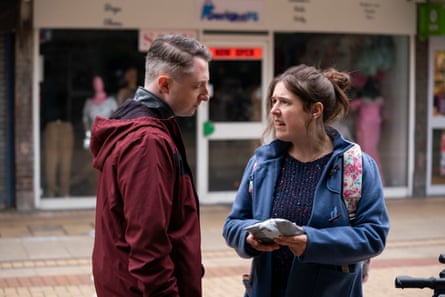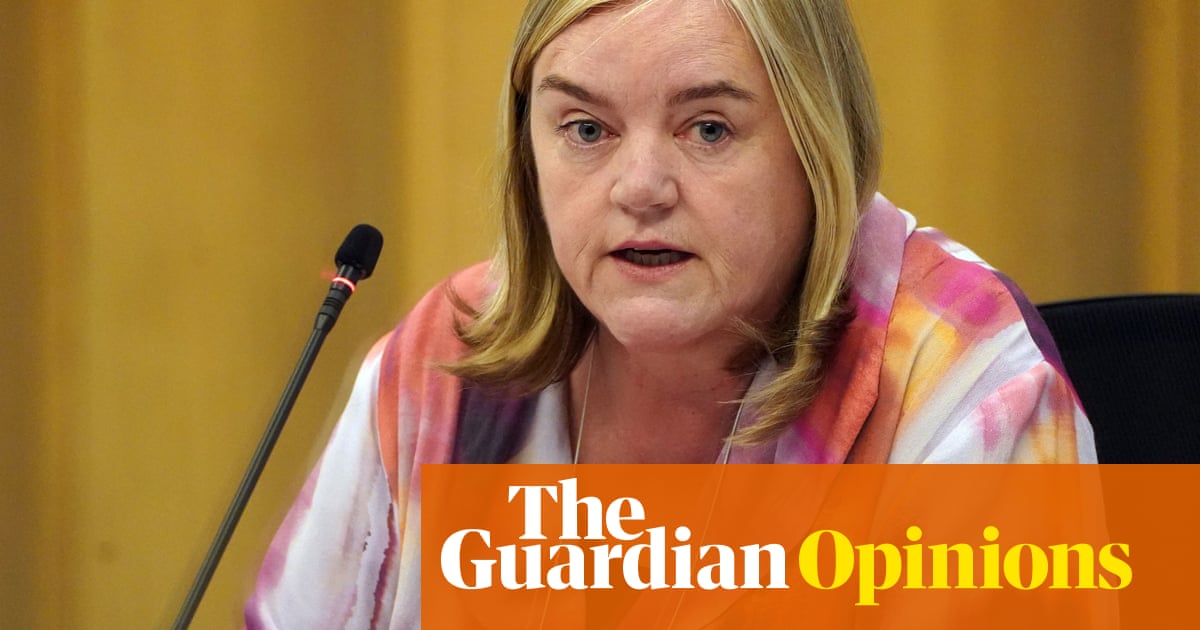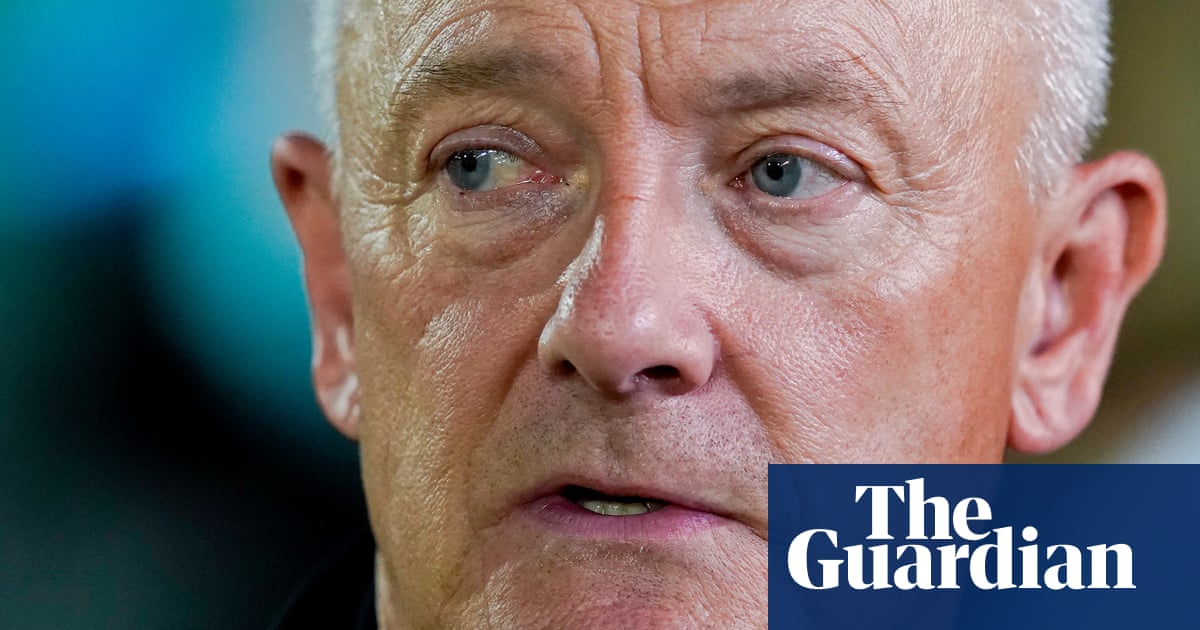‘No,” says Rosie Jones with a laugh. “I have never done any drug-related illegal activity, believe it or not. But I respect your attempt to try to get me to reveal I am an underground drug dealer. Sorry – not the world I live in!”
We’re having this conversation because Pushers, the comedian and actor’s new series about a disabled woman who turns to drug dealing when her benefits are stopped, kicks off this week on Channel 4. Jones wrote the script and stars as the main character, Emily. How much of it is influenced by her own life? There are, undoubtedly, similarities. “From the very beginning,” Jones says, referring to when she originally came up with the idea, back in 2018, “we knew my character would be northern, working class and disabled.” That was important for two reasons: firstly, Jones’s favourite sitcoms growing up all featured “gritty” northern characters; and secondly, those sitcoms lacked any representation of disability.
That’s where the similarities end, though. “Not to get too political too quickly,” she says with a grin, “but we wanted to show what it’s like to be working class and disabled right now – because, well, basically it’s shit for a lot of people. I think Emily is very different from me because, unlike me, she’s not had opportunities. She’s not really had supportive family. She’s gone under the radar. When we meet her, she’s almost invisible.” Invisible is definitely not a word you would use to describe Jones, but that’s the point: she wants to highlight the reality of life for the disabled people who aren’t on national TV.

“Obviously I want the sitcom to be entertaining,” says the 34-year-old as we chat over Zoom. “But in my opinion, the best comedy engages with reality and says something about the state of affairs in the country. When we came up with the concept, there was a Conservative government and I had just had my benefits cut, so it’s rooted in that reality. We wanted to say something about how the Tories were treating disabled people.” She pauses. “It won’t surprise any reader that I am on the left. I am liberal. I’m a Labour-voter, so when Labour came in last year, personally I was like, ‘Yes! Come on!’ But in terms of the sitcom, I knew it wouldn’t be out until nearly a year into a Labour government. I thought we would be living in a utopia where every disabled person gets the funding and services they need, and there wouldn’t be a need for a sitcom about benefits.”
She’s joking, but her disappointment with the direction the government has taken is evident. “Sadly,” she says, “now I think we need it more than ever. I’m incredibly angry.” Consequently, she is quite happy for Pushers to be seen as a commentary on what’s happening politically.
Since March, when Labour announced sweeping cuts to Pip, the main disability payment, as well as the health-related top-up for people on universal credit, Jones has been at the forefront of opposition. Last month, she was one of more than 100 celebrities and prominent disabled people who signed an open letter to the prime minister, calling the cuts “inhumane”. She doesn’t see any tension between being famous for comedy and taking a political stand. In fact, she thinks they go hand in hand.
“My hero is Billy Connolly. And I think the most intelligent people in the world aren’t politicians – they’re comedians, because we have the power to say something true and real and political and topical, but still make people laugh. It’s disarming. It gets people’s guard down. A lot of people say to me, ‘You should be a politician.’ And I say no, because I have too much fun making people laugh, but also because I fundamentally believe I can make more change and have more influence being a comedian – because people listen to me. And when they watch the sitcom or come to one of my gigs, they can say they had a great night but also, ‘I’ve never thought before about what it’s like to be a disabled person, or what it’s like to be disabled under this government.’ So I’m slowly chipping away. It’s not hard to have politics in comedy. It’s actually a no-brainer.”
That’s certainly true of her forthcoming standup tour, called I Can’t Tell What She’s Saying – a refrain Jones, who has a speech impediment, hears all the time. “It’s a reference to a lot of the haters I get online, who say they can’t tell what I’m saying, quickly followed by, ‘She’s not funny.’ I’m like, ‘How do you know I’m not funny if you can’t bloody tell what I’m saying?’ So, like everything I do in life, it’s me facing the haters full-on and saying, ‘This is me. You can’t hurt me. Stop your silly comments because I’m just going to keep doing a job that I adore.’”
Politics also features in the show’s content, which marries jokes about being single with jokes about being treated as a spokesperson for vast swathes of the population. (“Oh,” the press release cheerfully adds, “and boobs.”)
“It’s about the struggles of trying to find love while navigating the weird world of TV and fame and success and power. It’s also about the pressure of feeling the need to represent disabled people, even though I am a bit of an idiot. First and foremost, I want to make people laugh. There’s so much bad stuff happening, if people give me their evening, I want to give them a giggle. But I do touch on politics and how disabled people are being affected right now. Being a disabled person with a platform means I have to talk about the bloody government. Of course I do.”

It’s not all politics though. “As a good Yorkshire lady, my new show is about gravy!” she adds, speaking more seriously than at any other point in our interview. “Because I love gravy. Cut me open and I’d bleed gravy.”
These days, it’s not only comedy keeping Jones busy. “Sometimes,” she says, “I feel a little bit overwhelmed by the fact that I’m a writer who writes books but who also writes sitcoms. I’m also a standup comedian, and an actor, and also a presenter. I’m also a founder and trustee of my own foundation.”
The Rosie Jones Foundation was launched in April to “empower lives and change minds so that no person living with cerebral palsy (CP) ever feels alone or unheard”. It aims to tackle the high prevalence of mental health issues among teenagers and adults with CP. A 2019 study found that “the risk of depression was 44% higher and the risk of anxiety 55% higher” in adults with the condition than among their non-disabled peers.
The foundation takes a multi-pronged approach. Firstly, it matches people seeking support with therapists who share and understand their experience of disability. For Jones, that “common ground” between therapist and patient is key. Secondly, it provides spaces for disabled people and their families, who are often at risk from loneliness and isolation, to meet and share experiences (Jones will be holding meet-ups in her tour locations). Lastly, it curates workshops for young people with CP to learn skills and confidence, helping them access the social and financial benefits that come from work or volunteering.
For Jones, it’s all linked. “Naturally, the cuts and the lack of funding for support right now take a toll on disabled people’s mental health. That’s what the foundation was set up to work on. Even though there isn’t a direct connection between the sitcom, my standup and the foundation, it all plays into the same cause, of me just trying to make the world better and more welcoming for disabled people.”
Jones emanates a sense of drive. It shines from her. Just before we say goodbye, she tells me something that seems to characterise everything she does. “I’m a proud, passionate disabled woman,” she says. Her work makes sure we know it.

 6 hours ago
2
6 hours ago
2

















































